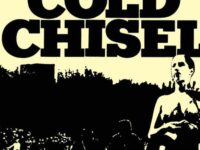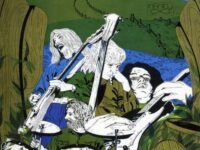Starting out as a prog-rock band in the early ’70s, the New Zealand-based Dragon derived their name from the I Ching readings of original vocalist Graeme Collins. He left the band and was replaced by their bass player, Todd Hunter’s brother Marc, before their debut album had even arrived. Still, the Dragon name stuck long after Collins was merely a memory.
Universal Radio and then Scented Gardens for the Blind went largely ignored by the listening public, before Dragon reinvented themselves as local pop stars. Thanks to the songwriting skills of keyboardist Paul Hewson, they started to see the success that they’d never found as a prog-rock band.
Hewson’s songs were infectious and also began to catch the ears of Aussies from across the Ditch – the Tasman Sea that separates Australia and New Zealand. They followed 1976’s Running Free and 1977’s Sunshine with 1978’s O Zambezi, assembling a triple threat of solid pop albums.
Unfortunately, Dragon’s attempt to cross over to the U.S. market in the drug-addled ’70s was doomed by record label execs and promoters who mistakingly paired the group with Texas bluesman Johnny Winter. Soon, Winter’s group was placing bets on how long it would take before someone in the audience shot lead Dragon’s drug-addled vocalist Marc Hunter.
At one point, he hurled a homophobic slur at a Texas audience and they began to throw things. Then Hunter suddenly realized his bandmates had already put down their instruments and escaped the melee.
“It took ages to clear the pile of debris on the stage – broken glass, bottles, chairs, half a table,” he told biographer Glenn A. Baker in 1994, “but I was totally unaware of this. I thought I was going over really well and I’m standing there in a crucifixion pose with my arms out, really gone, with heaps of eye make-up on, looking like some sort of twisted priest.
“Then I turned around and saw no one was on stage, so I realized I wasn’t going over too well after all and I went back to the dressing room and everyone was just standing there,” Hunter added. “I said ‘We went great; weren’t we terrific?’ At that stage of the band, I was really a shocking sod. And all the record company people were just staring at me like I was an insectoid from Mars. And so that was it for us for that trip to America.”
O Zambezi nevertheless became Dragon’s ’70s pinnacle. The songs, including the Hewson-penned hits “Are You Old Enough?” (despite very cringy lyrics when heard through a post-#MeToo filter) and “Still In Love With You,” are fun and accessible. Even the weakest of the album cuts are decent.
These successes are all the more notable since drummer Kerry Jacobsen, Hewson (to my knowledge no relation to U2’s Bono, also named Paul Hewson) and Hunter were heavy heroin users. O Zambezi has no right to be anywhere near this good.
Had U.S. record execs and promoters had any idea what to do with Dragon, they would have paired them with a more suitable touring partner like the Bee Gees, who in 1978 could do no wrong on Top 40 radio. On the other hand, Dragon’s catchy power-pop draws an uncomfortable contrast with Johnny Winter; that pairing was akin to a tour with Duran Duran opening for Metallica.
It’s a shame, as all three of Dragon’s LPs with Marc Hunter deserved to be heard by a much wider audience than merely New Zealand and Australia. To this listener, O Zambezi remains the strongest of their initial era.
Following this album’s release, however, Hunter’s substance-fueled behavior was deemed to be a liability and his bass-playing brother Todd was handed the unenviable job of giving his brother his walking papers. Dragon soldiered on with a new vocalist, Billy Rogers, and even added a violinist Richard Lee for one more ’70s album. But Power Play was largely ignored by the listening public and Dragon split up.
Marc Hunter released his solo debut Fiji Bitter, which found some success with the single “Island Nights,” before rejoining Dragon a few years later in the early ’80s. They’d then enjoy a second wave of success on both sides of the Ditch, but that’s another review for another time.
- The Most Surprising Moment on Alan Parsons Project’s ‘Eve’ - August 27, 2024
- Why the Audiobook Versions of Jimmy Barnes’ Autobiographies Are Definitive - June 24, 2024
- Kahvas Jute – ‘Wide Open’ (1970): Antipodean April - April 28, 2024




